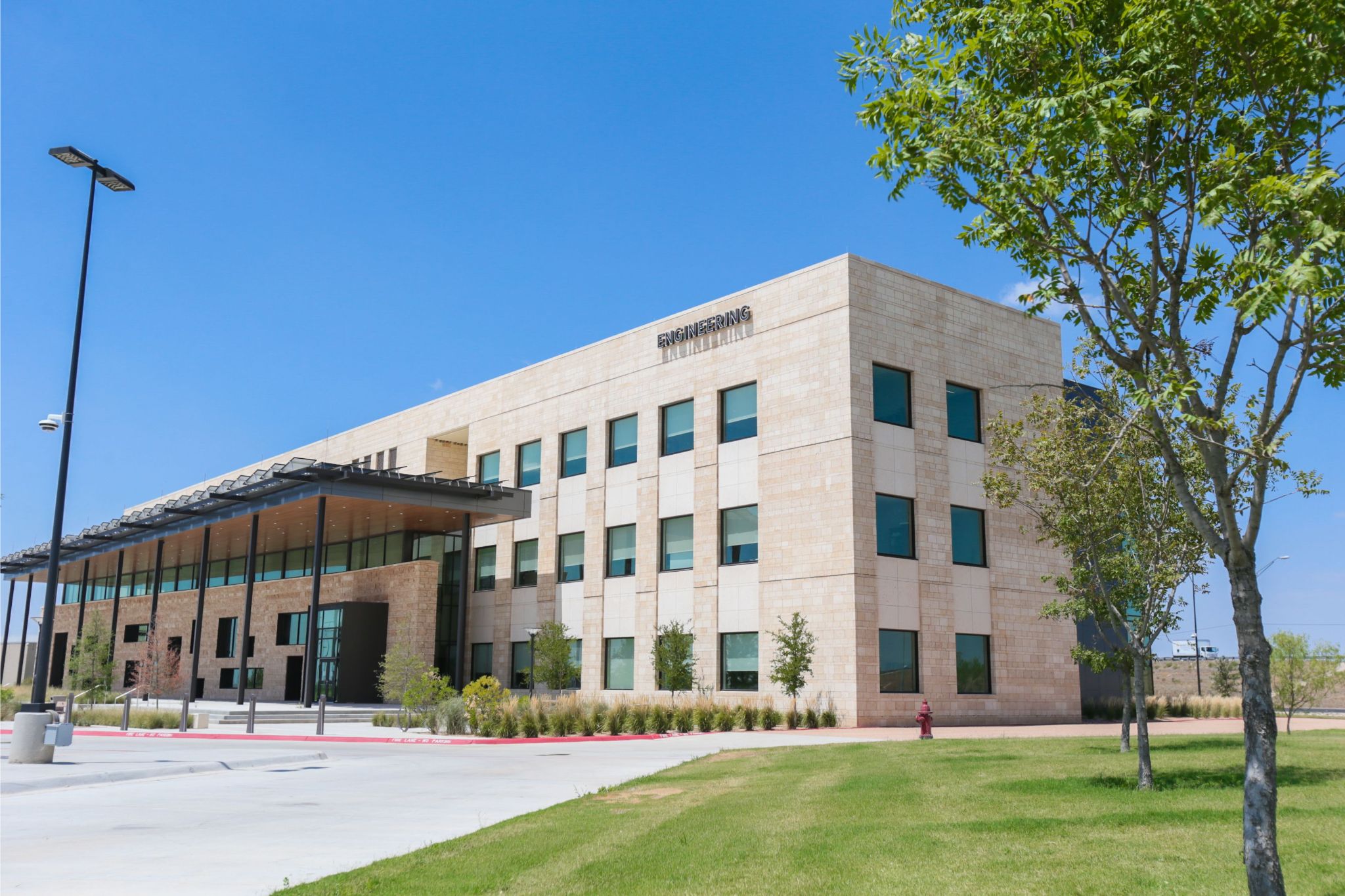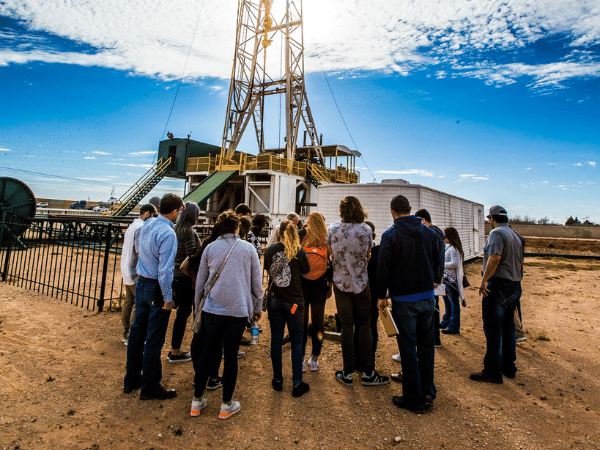The Permian Basin is one of the fastest-growing, economically invigorated regions of the country—full of industry, culture, and wide-open spaces. At the academic heart of this revitalized area sits The University of Texas Permian Basin—which, every year, delivers smart, savvy leaders into the communities of the Basin and across the U.S. As an institution, we remain committed to filling workforce gaps and innovating for the future.
The oil and gas industry relies on a variety of skills and expertise, most notably engineers. UT Permian Basin offers bachelor’s degrees in chemical, electrical, mechanical, and petroleum engineering. Additionally, the University offers a master's program in mechanical engineering. UT Permian Basin ranks #1 for Best Value Engineering Schools in Texas (2021). In 2019, US News and World Report ranked UTPB #1 for highest paid petroleum engineers. The University is home to a brand new 105,000 square foot engineering building with state-of-the-art labs, lecture halls, and advanced technology. Students thrive with a 14 to 1 faculty to student ratio, opportunities for paid internships with industry leaders, and robust recruitment from the world’s top producing firms.

“I feel really confident coming out of UTPB as an engineer,” said recent UTPB College of Engineering Graduate, Nolan Hines. “I think every one of my professors knows me by my first name. I can have conversations with any of them whether it’s about school or not.”
Many engineers find the opportunity to expand their skill set with a graduate certificate in Engineering Project Management. The credential is designed for those who have completed a bachelor’s degree in engineering, computer science, or business. It is structured to develop advanced skills for managing and leading engineering projects from initiation to completion. Classes include Essentials of Engineering Project Management, Advanced Engineering Economics, and Quality and Risk Management.
UT Permian Basin is committed to serving the region, and that means developing programs that are relevant to industry needs. When leaders expressed concern about a shortage of landmen in the area, the College of Business responded with a uniquely developed Bachelor of Business Administration (B.B.A) in Energy Land Management. The goal is simple: prepare graduates to work in energy business and the landman profession. The faculty along with business leaders who advise the college, believe an understanding of business management, the energy industry, and law related to the energy industry are essential for professionals in the industry. The B.B.A. in Energy Land Management is perfect for students interested in careers managing property, mineral, and water rights in the petroleum, solar, or wind energy industries or in real estate.
The Master of Business Administration (MBA) and Master of Professional Accountancy (MPA) programs produce leaders in all industry sectors. UTPB’s MBA has tracks in accounting, finance, and marketing, plus a Graduate Certificate in Energy Business is popular with managers in the Permian. This 12-hour program can be taken as a stand-alone graduate certificate (most anyone holding an undergraduate degree can pursue), or as part of the MBA or MPA curriculum.
“The faculty in the College of Business at UTPB are there to help you grow as a student and as a professional. They provide you with all the necessary tools to succeed. The professors are extremely knowledgeable and have real-life experience in the topics that they teach as well as extensive research in their fields of study,” said UT Permian Basin MBA graduate, Oscar Gonzalez Foreseck.
A critical need for energy exploration includes geological expertise. UT Permian Basin offers both bachelor’s in geology and chemistry and master’s in geology with a graduate certificate available in geospatial/GIS. These programs prepare students for careers in petroleum, mining, water resources, environmental management, environmental geology, governmental agencies, engineering geology, geochemistry, geophysics, and natural resources. UTPB students are well trained in the UTPB Natural Resource Center that collaborates with industry on real world geologic and chemical solutions. Many graduates of UT Permian Basin’s geology and chemistry programs go on to work in the energy industry. They often take jobs in exploration, laboratory, well site operations, and field services.
Other highly sought-after educational paths include chemistry, cyber security, and computer science. With bachelor’s and master’s degree opportunities, interested students can choose a track in environmental chemistry, environmental geology, data science, and software development – all critical components to modern oil and gas exploration.
UT Permian Basin offers opportunities specifically for students who are already actively working in the oil and gas industry. The Industrial Technology programs include a certificate in Petroleum Technology with courses on Drilling Technology, and Wireline, Mud Logging, and Core Analysis. Students use their associates or bachelor’s degrees to get the training and credentials they need to move up in their companies. The University also offers a Bachelor of Arts in Applied Science (BAAS) for students who come in with an AAS degree. Many UTPB business students add an Energy Business Certificate, preparing them to contribute to firms throughout the Permian Basin.
 Research initiatives at The University of Texas Permian Basin are focused on solving real world problems in the energy industry. The Texas Water and Energy Institute (TWEI) provides a multi-disciplinary and multi-institutional approach to complex issues dealing with produced water, wastewater, and drinking water. Research ranges from water quality, water-energy interdependencies, water security, water infrastructure protection, and related policy issues. The TWEI in conjunction with Chevron also hosts a lecture series to create a learning environment where industry, academia, and government agencies can network, and discuss state-of-the-art treatment technologies with current produced-water management strategies. The series is also an opportunity for professional development.
Research initiatives at The University of Texas Permian Basin are focused on solving real world problems in the energy industry. The Texas Water and Energy Institute (TWEI) provides a multi-disciplinary and multi-institutional approach to complex issues dealing with produced water, wastewater, and drinking water. Research ranges from water quality, water-energy interdependencies, water security, water infrastructure protection, and related policy issues. The TWEI in conjunction with Chevron also hosts a lecture series to create a learning environment where industry, academia, and government agencies can network, and discuss state-of-the-art treatment technologies with current produced-water management strategies. The series is also an opportunity for professional development.
UT Permian Basin will soon be home to the Advanced Manufacturing Center (AMC). The broader impacts of the center include: advancing discovery and understanding of new technologies; increasing access to manufacturing techniques; improving a sustainable framework for the region’s economic diversification through manufacturing; and increasing university-industry partnerships and student engagements.
The University will also offer an Advanced Manufacturing Certificate. This program serves as a “bridge” between the traditional academic curriculum and industrial applications. As a credit-granting certification program, students may transfer credits toward their master’s degree. This is an excellent opportunity for people who wish to get back into an academic setting. It also provides a competitive advantage in the local industry and bolsters workforce development.
The Permian Basin is blessed with valuable natural resources and an entrepreneurial drive that inspires people who are willing to take a chance and do something big! UTPB embraces that wildcatter’s spirit and this year they are launching multiple projects to support innovation and workforce development. With help from the Midland Development Corporation (MDC) and the Odessa Development Corporation (ODC), the University is launching programs to nurture ideas that grow the economy in a stable, sustainable way. At the Center for Energy and Economic Diversification (CEED) the focus will be managerial training, shared office spaces, and support for startup businesses. This will also be home to an incubator which makes technological, scientific, and management expertise available through UTPB faculty and services. A MakerSpace provides opportunities for people with good ideas to mingle and access tools that help them produce prototypes. The end result will be a place to bring innovative concepts to market to begin the commercialization process.
On UTPB’ the Odessa campus, an Innovation Center stocked with 3-D printers, Computer Aided Design (CAD) tools, and much more will support the development of product prototypes. The Blackstone Launchpad by Techstars will support budding entrepreneurs and next-generation leaders within the University’s student body. The space will also be complete with a MakerSpace.
As the oil and gas industry continues to recover the demand for a highly skilled workforce becomes more important. With three strong academic institutions, each dedicated to providing quality training and preparation, the future is bright in the epicenter of the oil and gas industry.




